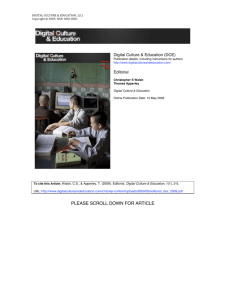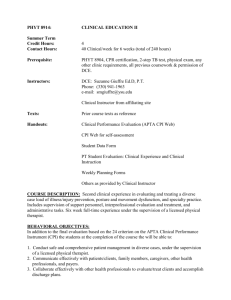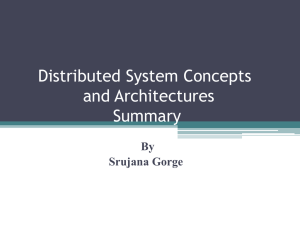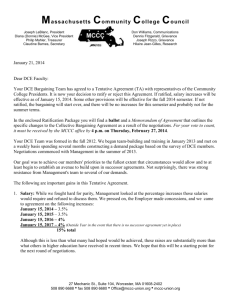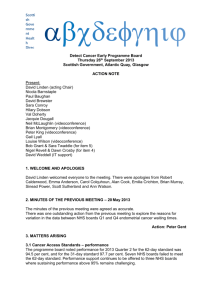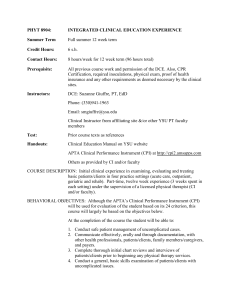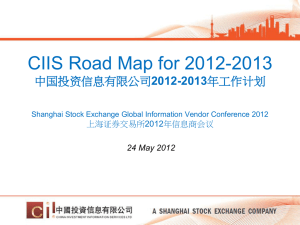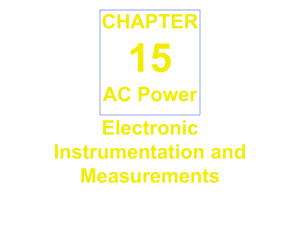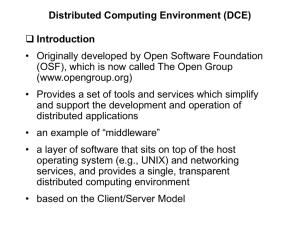- Open Research Online
advertisement
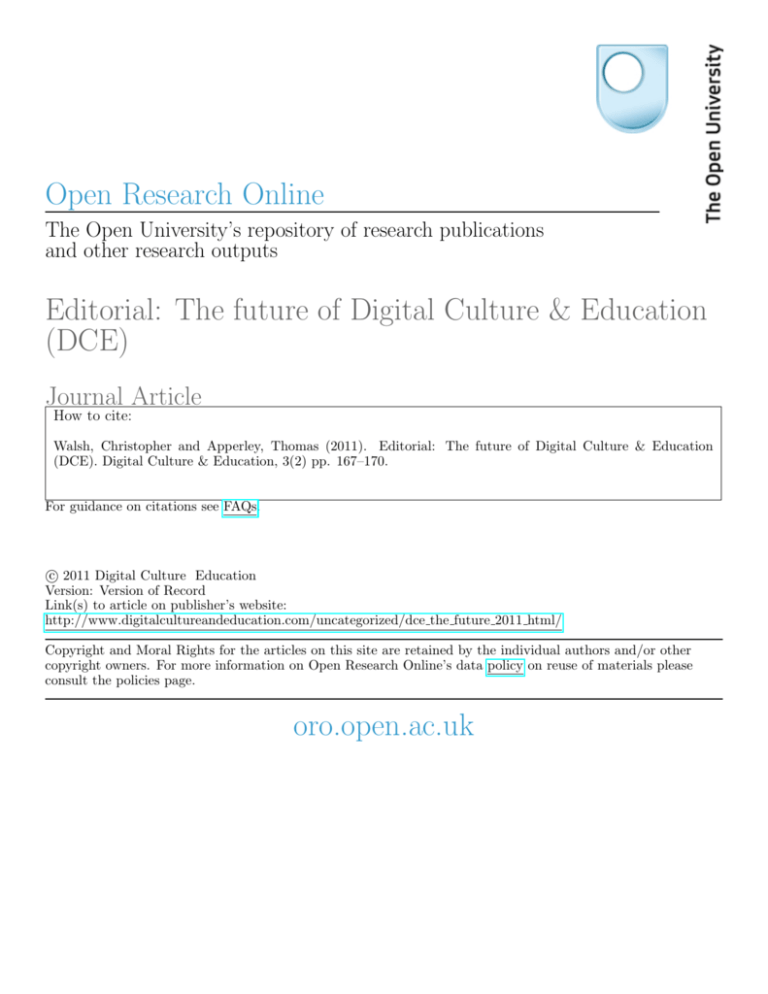
Open Research Online The Open University’s repository of research publications and other research outputs Editorial: The future of Digital Culture & Education (DCE) Journal Article How to cite: Walsh, Christopher and Apperley, Thomas (2011). Editorial: The future of Digital Culture & Education (DCE). Digital Culture & Education, 3(2) pp. 167–170. For guidance on citations see FAQs. c 2011 Digital Culture Education Version: Version of Record Link(s) to article on publisher’s website: http://www.digitalcultureandeducation.com/uncategorized/dce the future 2011 html/ Copyright and Moral Rights for the articles on this site are retained by the individual authors and/or other copyright owners. For more information on Open Research Online’s data policy on reuse of materials please consult the policies page. oro.open.ac.uk DIGITAL CULTURE & EDUCATION, 2(2) Copyright © 2010, ISSN 1836-8301 Digital Culture & Education (DCE) Publication details, including instructions for authors http://www.digitalcultureandeducation.com/ The future of Digital Culture & Education (DCE) Christopher S. Walsh Open University, UK Thomas Apperley Monash University, Australia Online Publication Date: 15 December 2011 To cite this Article: Walsh, C. S., & Apperley, T. (2011). Digital Culture & Education: The future of Digital Culture & Education. Digital Culture & Education, 3:2, 167-127. URL: http://www.digitalcultureandeducation.com/cms/wp-content/uploads/2011/12/dce_the_future_2011.pdf PLEASE SCROLL DOWN FOR ARTICLE The future of Digital Culture & Education (DCE) ___________________________________________________ Editorial: The future of Digital Culture & Education (DCE) Christopher S. Walsh & Thomas Apperley When we began editing Digital Culture & Education (DCE) 3 years ago, we embarked on what for us, and for many of our readers, was a new journey. The journey was about making scholarly work around digital culture and education available via open access (OA) to challenge the hegemony of publishers by providing all articles in digital and downloadable print formats. This makes the scholarship in DCE widely accessible and our intention is to remain OA in the future. DCE has been working to redefine and/or further digital culture’s focus and relationship with educational scholarship that theorises identity, globalisation, health, development, sustainability, wellbeing, subjectivities, networks, new media, gaming, multimodality, literacies, entrepreneurship and related issues. It is a deliberate move on our part to engage a cosmopolitan and globalised audience for DCE by providing an interactive scholarly context for the uptake of new technologies alongside the emergence of digital culture and its impact on teaching, learning and research across institutional and non-institutional contexts. Volume 3, Issue 2 successfully marks the three-year anniversary of DCE. To increase the visibility of all articles we also joined the Directory of Open Access Journals (DOAJ) in 2010 and made our editorial board transparent and public. To date we have published 34 articles, 3 book reviews, 2 conference reviews and an interview. We have also supported 2 special guest edited issues: one by Dana Wilber entitled “Beyond ‘new’ literacies” and the other on digital games and second language acquisition in Asia by Michael Thomas. After three successful years, we want to take this opportunity to thank all of our editorial board members for their tremendous support and the invaluable service they have provided to help make DCE a success. DCE’s editorial board is transdisciplinary and has expertise on theory and research in areas of digital culture which are relevant across diverse contexts. The editorial board is continuing to grow and the journal brings together scholars from education with scholars from emerging new media fields, such as mobilities, game studies, internet studies and digital aesthetics. Additionally, many anonymous reviewers have contributed to DCE. Their commitment to high quality feedback and the vision of the journal have had an enormous impact on manuscripts published and the wider impact of the journal internationally. We rely entirely on the dedicated and uncredited labour and would like to thank all reviewers on our behalf as editors, but also on behalf of the authors they provided feedback to. As the editors of DCE, we also want to acknowledge that the journal was initially made possible through an Australian Research Council (ARC) grant entitled “Literacy in the Digital World of the Twenty First Century: Learning from computer games” (20072010). The successful team awarded the grant consisted of Professor Catherine Beavis (Griffith University), Professor Clare Bradford (Deakin University), Dr. Joanne O’Mara (Deakin University) and Dr. Christopher S. Walsh (The Open University, UK). The grant was an ARC Linkage Grant and our industry partners were The Australian Centre 167 Walsh & Apperley for the Moving Image (ACMI), The Victorian Association for the Teaching of English (VATE) and the Department of Education and Early Childhood Development (DEECD). Dr. Thomas Apperley (Monash University) was the grant’s research fellow and Dr. Amanda Gutierrez (Australian Catholic University) was the project’s research assistant. The project was extremely successful and more information can be obtained by visiting the project website at www.learningfromcomputergames.com. The future outlook for DCE is very positive and encouraging. We are increasingly receiving more submissions and requests for special guest edited editions. Next year DCE anticipates having at least three issues, perhaps four. Of particular interest is the special themed issue “Building the HIVe: Increasing social and political science representation in the HIV field by gay men, other men that have sex with men (MSM) and transgender (TG) communities deploying digital technologies” edited by Gurmit Singh (University of Leeds), Christopher S. Walsh (The Open University, UK) and George Ayala (The Global Forum on MSM & HIV -MSMGF) with an introduction by Judith D. Auerbach, the former Vice President of Science and Public Policy at the San Francisco AIDS Foundation. The issue will present 8 articles from around the globe. The articles highlight how community-based researchers, practitioners and activists designed and shared networked and digital community-based and led interventions to address that social and technological drivers of HIV to transform HIV prevention and education in their localized contexts. Volume 3, Issue 2 In our current issue we present timely articles on digital culture that investigate the role of active gaming in fighting childhood obesity, youth’s digital video production that assists them in dealing with personal and community problems by drawing on their multimedia compositions as a form of healing and game based learning to enact a pedagogy of ‘learning as becoming’ in classroom contexts. Additionally there is an article on the Audio Visual Achievement in Literacy Language and Learning programme in New Zealand. For the first time, DCE has published a provocative interview on the Critical Point of View collective and we conclude the issue with a review of the Key Competencies in the Knowledge Society (KCKS) conference (2010). Lisa Witherspoon Hansen and Stephen W. Sanders’ article “Active gaming: A new paradigm in childhood physical activity”, explores how childhood obesity in the United States is on the rise and how technology is often blamed for creating an increase in sedentary lifestyles. They put forth an argument for active gaming as a possible cure. They describe active gaming as a contemporary approach to exercise that provides children and young people essential daily physical activity and exercise. They illustrate how the use of active gaming equipment and the creation of new facilities for active gaming is becoming more accessible. They also argue that active gaming works because it is aligned with adolescent culture and lifeworlds by providing physical activity via gaming technologies as an alternative to traditional exercise. Benefits as well as concerns and considerations of active gaming are discussed in order to clearly appreciate the impact the medium is currently having on the daily physical activity patterns of children and young people. The second article, “Learning as becoming through performance, play, and dialogue: A model of game-based learning with the game Legends of Alkhimia”, by Yam San Chee describes the challenge of designing game-based learning to enact a pedagogy of 168 The future of Digital Culture & Education (DCE) ‘learning as becoming’ in classroom contexts. Chee argues that the theory of human information processing fails to provide a tenable account of human learning. He proposes a pragmatist notion of education that foregrounds experience and inquiry to provide an alternative foundation for envisioning education in the present. Then, drawing on social theory to provide a theoretical framing for game-based learning design, she instantiates this framing through a Performance–Play–Dialog (PPD) model. In conclusion Chee argues in favour of a shift to performance as a key construct for framing human learning by illustrating the PPD Model using the game Legends of Alkhimia. “When I make a film, it’s out of my head”: Expressing emotion and healing through digital filmmaking in the classroom” by Brian Baily reports on a two-year ethnographic study in two high schools where adolescents used digital video production in school to express emotions, deal with personal and community problems and even draw on their multimedia compositions as a form of healing. Baily illustrates how youth are using digital literacy to help them to make sense of their lives while attempting to make changes within themselves and their communities. Bailey draws on New Literacy Studies’ theoretical framework, to argue that the literacy practices of adolescents in his study allow them to make sense of issues and emotions in their lives and cope with their life circumstances through showcasing their films to audiences within and beyond their schools. Faye Parkhill, Jilaine Johnson and Jane Bates’ article, “‘Capturing literacy learners: Evaluating a reading programme using popular novels and films with subtitles” explores the Audio Visual Achievement in Literacy Language and Learning (AVAILLL) programme in New Zealand. AVAILLL is an inexpensive, innovative, multimedia, sixweek intensive reading programme to supplement classroom practice through the use of popular, subtitled movies and accompanying novels. The AVAILLL programme is used to engage students in reading through with targeted literacy-based activities. It has been implemented effectively in Christchurch, and other schools in New Zealand and the USA. Their paper reports on a large experimental research study examining the effectiveness of the AVAILLL programme. The authors present findings from six New Zealand schools which indicated gains in pupils’ comprehension and vocabulary, with sustainability of improvement over a six-month period alongside a noteworthy increase in fluency and engagement in reading. In “Review of Key Competencies in the Knowledge Society Conference 2010: Elearning and computer competency research in the age of social media”, Michael Nycyk the Key Competencies in the Knowledge Society conference, held as part of the International Federation for Information Processing World Computer Congress in Brisbane, Australia. Nycyk discusses the uniqueness of this conference which presents a transdisciplinary mix of research from commercial and corporate sectors, non-profit organisations, government departments, schools and academic researchers from many countries. He provides a detailed review of the conference and highlights how social media and technological devices are educational tools are now becoming indispensable for learning and acquiring information and knowledge. In DCE’s first ever interview, with Nathaniel Tkacz, we learn about the Critical Point of View (CPOV) collective project that brings together researchers with a focus on Wikipedia. Tkacz describes how CPOV is first and foremost a research network, maintained in part through a discussion list with outputs included three conferences (in 169 Walsh & Apperley Bangalore, Amsterdam and Leipzig), two websites and most recently an edited anthology, CPOV: A Wikipedia Reader. Of interest to DCE readers is how CPOV discusses the relationship between Wikipedia and Education. The cover image of DCE is courtesy of Orange Segment Print and Design Studio based in Manilla, founded in 2004 by graphic designer Alexis R. Pamintuan. The company started in graphic design but quickly expanded to digital printing. Today, they cater to a wide variety of clientele — from students, freelance artists, professional photographers, government and private establishments — for their CNC routing, paper, large-format, fine art and novelty print and design requirements. For more information about Orange Segment Print and Design Studio, visit their website at http://orangesegment.ph/ DCE has an open call for proposals for the development of guest-edited special themed issues and cover art. Guest editors and artists should send a short proposal to editor@digitalcultureandeducation.com for more information. 170
